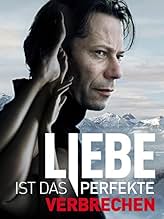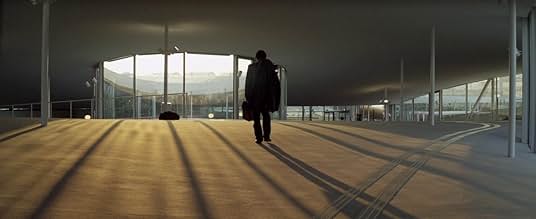AVALIAÇÃO DA IMDb
5,8/10
2,2 mil
SUA AVALIAÇÃO
Depois de um breve caso com seu atraente professor, uma jovem estudante desaparece misteriosamente. A polícia e a madrasta da menina apertam o laço sobre o misterioso professor.Depois de um breve caso com seu atraente professor, uma jovem estudante desaparece misteriosamente. A polícia e a madrasta da menina apertam o laço sobre o misterioso professor.Depois de um breve caso com seu atraente professor, uma jovem estudante desaparece misteriosamente. A polícia e a madrasta da menina apertam o laço sobre o misterioso professor.
- Direção
- Roteiristas
- Artistas
- Prêmios
- 2 indicações no total
Carl von Malaisé
- Le policier à moto
- (as Carl von Malaise)
Alain Börek
- Le collègue de Marc
- (as Alain Borek)
- Direção
- Roteiristas
- Elenco e equipe completos
- Produção, bilheteria e muito mais no IMDbPro
Avaliações em destaque
'Love is the Perfect Crime' ('L'amour est un crime parfait' in French) is one of the most formidable movie titles I can remember. A title that promises a combination of thriller and love story, which is indeed part of what the 2013 film directed by brothers Arnaud and Jean-Marie Larrieu proposes. The presence in the main role of Mathieu Amalric, one of my favorite French actors, heightened my curiosity to see this film. Of the many promises, only a part were justified.
Switzerland at the end of winter is the setting for the film. The snow-covered mountains represent since Hitchcock a scenery for films in the psychological thriller genre, with sunshine illuminating postcards landscapes behind which we can feel the threat, with snow covering tracks, traces and sometimes bodies, at least until the thaw. We deal with a plot in which part of the truth is hidden from viewers, which is a rule in most detective movies, but in this case the truth is hidden also to the heroes on the screen. Ambiguity is what characterizes their characters and feelings in this film. We are dealing with a criminal investigation (a student has disappeared and her teacher, a man with a fame of conqueror is one of the suspects) and with a late love story, but the reality behind the appearances is questionable to the very end.
What I liked: The role of Marc, the teacher of literary creation around which orbit the female students, but who is secretly haunted by his own traumas is perfect for Mathieu Amalric, who dominates the screen and the story with his feelings and dilemmas. The film is made 2-3 years before the 'me too' scandals broke out and the role would probably have been written differently if the film had been made now. The atmosphere of the Swiss university intellectual circles with their professional and romantic intrigues is very well rendered. The image is stylish and consistent. What I liked least: There are three women characters around Marc and the actresses' creations are uneven. If the interpreters of Marianne (Marc's sister - Karin Viard) and Annie (the student trying to lure Marc into a love affair - Sara Forestier) are neutral, Anna's key character is missed by Maïwenn's interpretation. The script suffers from a certain verbosity that makes the film seem long and repetitive from time to time. The ambiguity of the approach ultimately turns against the intentions of the filmmakers, and many viewers will already have been lost interest in the denouement by the end of the movie. Yet another proof that the performance of one single actor, no matter how good he may be, cannot sustain alone an entire movie.
Switzerland at the end of winter is the setting for the film. The snow-covered mountains represent since Hitchcock a scenery for films in the psychological thriller genre, with sunshine illuminating postcards landscapes behind which we can feel the threat, with snow covering tracks, traces and sometimes bodies, at least until the thaw. We deal with a plot in which part of the truth is hidden from viewers, which is a rule in most detective movies, but in this case the truth is hidden also to the heroes on the screen. Ambiguity is what characterizes their characters and feelings in this film. We are dealing with a criminal investigation (a student has disappeared and her teacher, a man with a fame of conqueror is one of the suspects) and with a late love story, but the reality behind the appearances is questionable to the very end.
What I liked: The role of Marc, the teacher of literary creation around which orbit the female students, but who is secretly haunted by his own traumas is perfect for Mathieu Amalric, who dominates the screen and the story with his feelings and dilemmas. The film is made 2-3 years before the 'me too' scandals broke out and the role would probably have been written differently if the film had been made now. The atmosphere of the Swiss university intellectual circles with their professional and romantic intrigues is very well rendered. The image is stylish and consistent. What I liked least: There are three women characters around Marc and the actresses' creations are uneven. If the interpreters of Marianne (Marc's sister - Karin Viard) and Annie (the student trying to lure Marc into a love affair - Sara Forestier) are neutral, Anna's key character is missed by Maïwenn's interpretation. The script suffers from a certain verbosity that makes the film seem long and repetitive from time to time. The ambiguity of the approach ultimately turns against the intentions of the filmmakers, and many viewers will already have been lost interest in the denouement by the end of the movie. Yet another proof that the performance of one single actor, no matter how good he may be, cannot sustain alone an entire movie.
Terrific snowbound locations are pretty much the only asset of this inert, predictable, overlong thriller. Mathieu Amalric is miscast as a middle-aged Don Juan (he is so irresistible that young girls PAY HIM to spend some private time with him, and even his sister cannot keep her hands off him). Maïwenn is also miscast as a femme fatale. *1/2 out of 4.
The film is in French with English subtitles and was shown as part of the Glasgow Film Festival.
The film opens with a night ride in a car up a snowy mountain. The driving is somewhat erratic and the occupants seem a little drunk. It is clear that this is an amorous liaison. The first of many in fact. The film, 15+ certificate, could in fact be subtitled: 'More Sex Please, We're Swiss'.
The film continues with the drive down the mountain. Again, and perhaps even more so this time, we get the sense of how dangerous it is to drive on these mountain roads. This is emphasised by the filming, which is very well done. It is further emphasised by the music, but sadly the music is just too loud and intrusive at this point. It is the only problem with the music, after this, all music is perfectly placed in the film to highlight the scenes. Much of the music is ambient and psychedelic and fits in very well with the feel of the film. There are also some well placed love songs with ponderous lyrics, and these also fit in well.
Film is about that walking cliché; the literature professor with the roving eye. And boy! does his eye rove! We see this clearly as he arrives to take his class. Entering this very modern place of learning, we find our very modern professor's eye roving around. Again, this is shown well in the filming. Much of this movie is shot from the professor's POV.
The professor seems to occupy two worlds. He lives up the mountain but works down the mountain. His home is an old-fashioned wood-built chalet, like that of 'Belle and Sebastian' or 'Heidi' and 'Goat' Peter. Down in the valley his place of work is so modern and futuristic looking, it would not look out of place in a SF film. Throughout the film these contrasts are shown well. The mountain scenery is stunning and is also shot well. There are scenes with a fresh look to them, others with a colder and darker wintery-look to them.
Travel between the mountain and the valley takes up a lot of time, especially if you stop off for a bit of recreational sex, but our professor does entertain us with his excuses. However this film is no French farce but rather a Hitchcockian suspense film. In style it reminded this reviewer of Sidney Gilliat's 'Endless Night' (1972) and Danny Boyle's 'Trance' of last year.
The acting in this film is universally superb. The male lead, playing the role of the professor, really seems to be able to convey his character to the audience, be it wolfing down his food, or just by looking or staring. A tour-de-force! He is however well supported by the three main actresses.
If therefore you like an erotic, raunchy, sexy, suspense-thriller, with tense twists, hanky-panky, hankys of blood, and buckets of sex, then you will enjoy this film. As the main protagonist in this film is a French-speaking, student-seducing, literature professor, there will be lots of philosophical and ponderous speaking too.
Good stuff! Oh la la! 10/10.
... and the scorpion said to the frog ...
The film opens with a night ride in a car up a snowy mountain. The driving is somewhat erratic and the occupants seem a little drunk. It is clear that this is an amorous liaison. The first of many in fact. The film, 15+ certificate, could in fact be subtitled: 'More Sex Please, We're Swiss'.
The film continues with the drive down the mountain. Again, and perhaps even more so this time, we get the sense of how dangerous it is to drive on these mountain roads. This is emphasised by the filming, which is very well done. It is further emphasised by the music, but sadly the music is just too loud and intrusive at this point. It is the only problem with the music, after this, all music is perfectly placed in the film to highlight the scenes. Much of the music is ambient and psychedelic and fits in very well with the feel of the film. There are also some well placed love songs with ponderous lyrics, and these also fit in well.
Film is about that walking cliché; the literature professor with the roving eye. And boy! does his eye rove! We see this clearly as he arrives to take his class. Entering this very modern place of learning, we find our very modern professor's eye roving around. Again, this is shown well in the filming. Much of this movie is shot from the professor's POV.
The professor seems to occupy two worlds. He lives up the mountain but works down the mountain. His home is an old-fashioned wood-built chalet, like that of 'Belle and Sebastian' or 'Heidi' and 'Goat' Peter. Down in the valley his place of work is so modern and futuristic looking, it would not look out of place in a SF film. Throughout the film these contrasts are shown well. The mountain scenery is stunning and is also shot well. There are scenes with a fresh look to them, others with a colder and darker wintery-look to them.
Travel between the mountain and the valley takes up a lot of time, especially if you stop off for a bit of recreational sex, but our professor does entertain us with his excuses. However this film is no French farce but rather a Hitchcockian suspense film. In style it reminded this reviewer of Sidney Gilliat's 'Endless Night' (1972) and Danny Boyle's 'Trance' of last year.
The acting in this film is universally superb. The male lead, playing the role of the professor, really seems to be able to convey his character to the audience, be it wolfing down his food, or just by looking or staring. A tour-de-force! He is however well supported by the three main actresses.
If therefore you like an erotic, raunchy, sexy, suspense-thriller, with tense twists, hanky-panky, hankys of blood, and buckets of sex, then you will enjoy this film. As the main protagonist in this film is a French-speaking, student-seducing, literature professor, there will be lots of philosophical and ponderous speaking too.
Good stuff! Oh la la! 10/10.
... and the scorpion said to the frog ...
L'amour est un crime parfait or Love is the Perfect Crime has two big things going for it. They are in no specific order; the gorgeous alpine locations and interesting post-modern university settings and the first act which intriguingly does manage to hook you into hanging around for the final outcome.
Unfortunately the second and third acts are increasingly filled with so many red herrings and almost unbelievably melodramatic contrivances on the part of the script writers, we know before we get there that the denouement will be unsatisfactory in the extreme. And so it proves to be.
We are never presented with a motive/reason for the first killing/murder, though sleep-walking (LOL!) is suggested. There is no real reason given for the siblings' odd relationship, apart from a mention that "their mother was too hard on them". Wow! I wondered why there was (plainly) an over-emphasis on the protagonist's smoking (to ridiculous lengths) in the film. And it was clearly to set up the climax with a bang. And seriously, if a big time gangster wanted to intimidate/investigate a character, I could never see them going to the theatrical lengths that are presented in this shaggy dog joke of a film.
The big reveal/twist when it appears is just laughable and just adds to the evidence that like a cheap Christmas gift gaudily packaged, Love is the Perfect Crime is all style with little substance.
Unfortunately the second and third acts are increasingly filled with so many red herrings and almost unbelievably melodramatic contrivances on the part of the script writers, we know before we get there that the denouement will be unsatisfactory in the extreme. And so it proves to be.
We are never presented with a motive/reason for the first killing/murder, though sleep-walking (LOL!) is suggested. There is no real reason given for the siblings' odd relationship, apart from a mention that "their mother was too hard on them". Wow! I wondered why there was (plainly) an over-emphasis on the protagonist's smoking (to ridiculous lengths) in the film. And it was clearly to set up the climax with a bang. And seriously, if a big time gangster wanted to intimidate/investigate a character, I could never see them going to the theatrical lengths that are presented in this shaggy dog joke of a film.
The big reveal/twist when it appears is just laughable and just adds to the evidence that like a cheap Christmas gift gaudily packaged, Love is the Perfect Crime is all style with little substance.
A more than decent attempt at a thriller mystery. Our main actor might not be the most likable person (far from it), but that doesn't mean we have to hate him. Actually the actor (very well known in France) does a great job showing more than one side on him. And even if you can see where this is going (or what actually happened), this ride is well worth going along with.
It might be a bit too long and the relationships are stretched a bit (though never feel fake or false, no pun intended), but the overall message is delivered. Great photography, with a very slow moving pace, that might not be everyones taste.
It might be a bit too long and the relationships are stretched a bit (though never feel fake or false, no pun intended), but the overall message is delivered. Great photography, with a very slow moving pace, that might not be everyones taste.
Você sabia?
- CuriosidadesFrench visa # 135966.
- Erros de gravaçãoMarc is a Literature teacher at the University of Lausanne. However, the campus shown in the movie is that of the EPFL, which specializes in science and technology.
- ConexõesFeatures A Idade do Ouro (1930)
- Trilhas sonorasL'un dans l'autre
Performed by Erik Truffaz and Christophe
Principais escolhas
Faça login para avaliar e ver a lista de recomendações personalizadas
- How long is Love Is the Perfect Crime?Fornecido pela Alexa
Detalhes
- Data de lançamento
- Países de origem
- Central de atendimento oficial
- Idioma
- Também conhecido como
- Love Is the Perfect Crime
- Locações de filme
- Empresas de produção
- Consulte mais créditos da empresa na IMDbPro
Bilheteria
- Faturamento bruto mundial
- US$ 2.907.305
- Tempo de duração1 hora 50 minutos
- Cor
- Mixagem de som
- Proporção
- 2.35 : 1
Contribua para esta página
Sugerir uma alteração ou adicionar conteúdo ausente

Principal brecha
By what name was O Amor é um Crime Perfeito (2013) officially released in India in English?
Responda
























